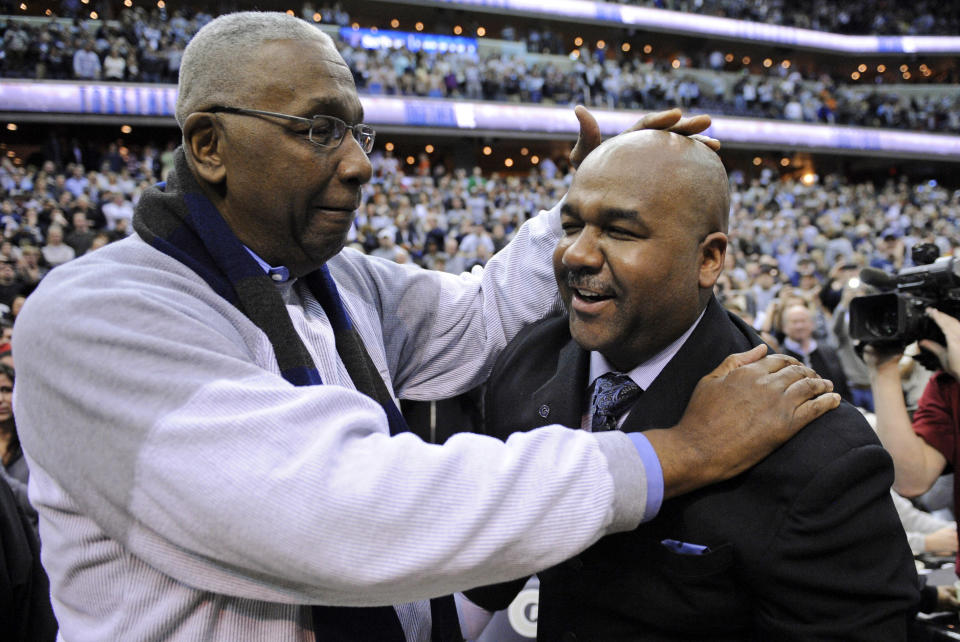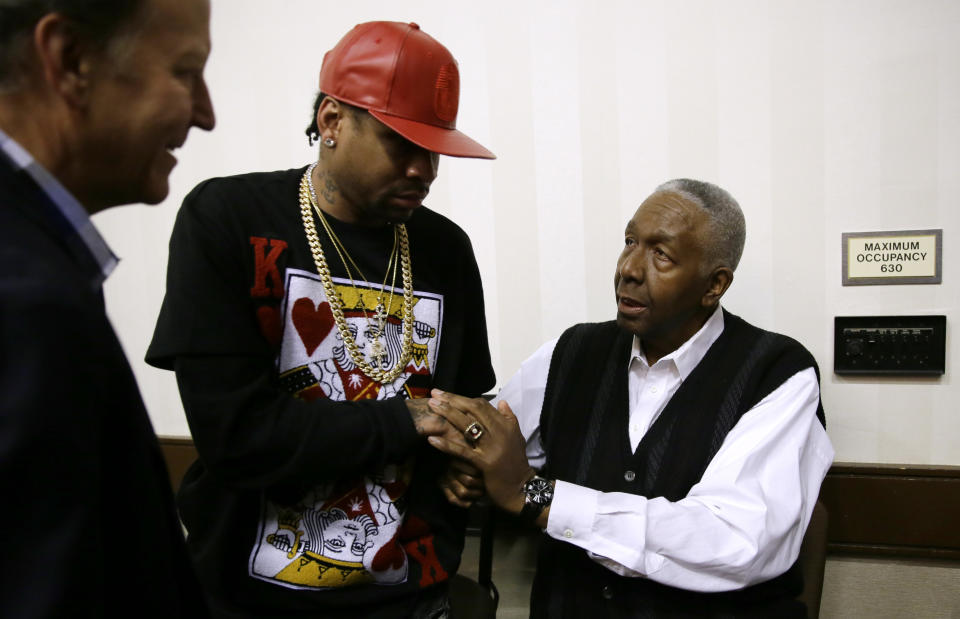The vast legacy of Georgetown’s John Thompson: 'He was a giant'
Georgetown icon John Thompson Jr. cast a looming aura over college basketball.
In person, his stature intimidated with his vintage sideline look — a towel slung over this shoulder and his face in a perpetual scowl. In accomplishment, he inspired generations of Black coaches to follow in his footsteps as the first African American coach to win an NCAA title. In legacy, his impact transcended the game as he built Georgetown into a cultural force, demanded reform from the NCAA and fought for the rights of young Black coaches and athletes.
John Thompson Jr. — known as “Big John” in basketball circles — has died. And was there ever a more fitting moniker than Big John? John Thompson Jr.’s impact reverberated through the game at every level, a pioneer so ahead of his time that his passing has left his peers and friends struggling to encompass and contextualize everything he accomplished in his 78 years.
“He was a giant,” said former Big East commissioner Mike Tranghese to Yahoo Sports on Monday. “What he did coaching speaks for itself. As we’ve sat here and watched what’s going on with the NBA and social justice, John did it 30 years ago. But he did it by himself.”
The highest compliment to Big John may be the varied offshoots of his legacies. As a coach, he won the 1984 national title, reached three Final Fours and ushered in an era of prominent Black coaches like Temple’s John Chaney, Arkansas’ Nolan Richardson and USC’s George Raveling.
Thompson also helped build the Big East into a power, with Big John a staple on Big Monday and delivering that league’s first national title.
Along the way, his suffocating style of pressing, physical defense and relentless effort helped turn Georgetown basketball into one of the generation’s defining programs. He somehow managed to turn a stodgy Jesuit school in Washington, D.C., into a swaggering urban brand. A Georgetown Starter jacket and a defensive stance were to Georgetown what baggy shorts and alley-oops were to Michigan’s Fab Five — touchstones that penetrated into pop culture.

And that was just basketball. Thompson Jr. famously walked off the court prior to a game against Boston College in 1989 to protest the NCAA passing Proposition 42, which would have primarily discriminated scholarship opportunities for Black athletes. The combination of Thompson’s success, ideals and persistent use of his platform made him perhaps the most important voice in the history of college basketball.
“John was a significant voice, he was right there with Muhammad Ali in terms of when John spoke on racial issues or different things, people listened,” said former Maryland coach Gary Williams. “He had the nation’s attention.”
What made Thompson such a transformative figure was that he not only built the platform to have such a major social impact, but he persistently used it. Thompson ignored the criticisms of conventional media and rarely courted the press’ approval.
“He said and did things to represent the Black point of view and people criticized him,” Tranghese said. “John was hated by a lot of people. It didn’t faze John. He was tough. He was really tough.”
Instead of shrinking to critics, he used his belief system to guide him along the way and relentlessly fought for Black athletes, Black coaches and equal opportunity. “He didn’t have a microphone, he had a megaphone,” said Mike Jarvis, the former coach at St. John’s and George Washington. “And he wasn’t afraid to use it.”
Jarvis got to know Thompson when Jarvis coached Patrick Ewing at Cambridge Rindge and Latin School. Ewing ended up as the seminal recruit of Thompson’s tenure at Georgetown, as he led the Hoyas to three Final Fours and rode shotgun on Thompson’s rise to prominence.
Not long after, Jarvis became the head coach at Boston University and recalls walking into the coaches’ hotel in Dallas for the 1986 Final Four and seeing Thompson holding court in the lobby. He recalls Thompson saying, “Come over here, boy,” and wrapping his arm around Jarvis.
Young coaches flocked to Thompson as he proved the generation’s quintessential trailblazer.
“I think he helped every young, aspiring Black coach’s career by what he was doing and the success he had,” Jarvis said. “John opened up a lot of doors with his success. It certainly didn’t hurt [my career], either.”
More than three decades later, when then-VCU coach Shaka Smart led the Rams to the 2011 Final Four, he crossed paths with Thompson a few times. Thompson never specifically told Smart to be a role model for young Black coaches, but Smart left the conversation with an understanding that, “You have a responsibility now,” both to his players and to other coaches.
Smart got choked up speaking about Thompson on Monday morning, reminiscing on just how much Thompson meant to him. He began following Georgetown as a kid in Wisconsin — “We couldn’t afford the Starter jacket,” he joked.
“It struck me in the chances I had to be around him in person, his intellect was other-worldly,” Smart said. “When you hear people like Maya Angelou or Toni Morrison speak, I’d put him on that level in terms of the way his mind operated.”
Thompson attended Archbishop Carroll High School in Washington, D.C., helped lead Providence College to the 1963 NIT title as a frontcourt enforcer and won two NBA titles (1965 and 1966). Thompson, who stood 6-foot-10 with shoulders as broad as his accomplishments, entered coaching soon after.
At Providence, an assistant coach by the name of Dave Gavitt became an integral figure in his career. Gavitt went on to help found the Big East and be one of college basketball’s most influential leaders of the past century.
After Gavitt’s funeral in 2011, Thompson pulled aside Gavitt’s son, Dan, and told him that the relationship his father built with him was a reason why he stayed at Providence while homesick during his freshman year. “He made me feel comfortable and welcome,” Dan Gavitt recalled Thompson telling him.
And that feeling was reciprocated to hundreds of players by Thompson in his career, as numerous coaches remarked about the intensity of Thompson’s relationship with his players.
“To me, his greatest legacy is one-on-one with all the players and coaches that he impacted by supporting them,” said Gavitt, now an NCAA vice president who runs the NCAA tournament. “In some cases, giving tough love. The impact he had on them as men and women will endure and last for a lifetime, and the generations of the people he impacted will follow.”
The Big East offered Thompson his biggest annual stage, filled with great players (Ewing, Alonzo Mourning and Dikembe Mutombo), great venues (Madison Square Garden, Carrier Dome) and worthy coaching adversaries (Jim Boeheim, Rick Pitino and Lou Carnesecca).

Thompson’s and Georgetown’s profile grew along with it, with the Hoyas’ punishing style of basketball making them an easy villain. Former Providence coach Rick Pitino recalled having one in-game run-in with Thompson in 1987.
Pitino admitted he was nervous in the postgame handshake line, but instead a moment unfolded that epitomized Thompson — graceful in loss yet eternally competitive. “He put his arm around me and said, ‘I’m really proud with what you’re doing with my alma mater, my team played flat tonight and I tried to motivate them.’”
Thompson then squeezed Pitino’s head and told him: “We’re going to kick your f------ ass when you come to Georgetown.”
Thompson’s most memorable quote from the early Big East days came when Georgetown upset Syracuse in the final game at Manley Field House and declared: “Manley Field House is officially closed!” That gave birth to a juicy rivalry that raged throughout the 1980s and 1990s, epitomizing the Big East’s outsized impact. (Thompson finished his career with a 596-239 record and 20 NCAA appearances in 27 years.)
While Syracuse had the sizzle of Pearl Washington and Sherman Douglas, Georgetown played with a bullying, pressing style that programs attempted to emulate for years.
“I don’t want anyone to forget how hard those teams played,” said Mike Jones, the coach at DeMatha Catholic who grew up watching those Georgetown teams. “You had to be tough to play for Georgetown.”
The breadth of Thompson’s resonance remains difficult to quantify. Michael Jordan released a statement about Thompson’s impact today. Steelers coach Mike Tomlin called him a “blueprint idol.” The loss was felt everywhere from the Nike boardroom to the USA Basketball headquarters to the Boys & Girls clubs around D.C. that Thompson quietly financially supported.
“I think his impact was greater than any coach I’ve witnessed since I’ve followed college basketball,” Smart said. “Really, basketball period.”
Former Seton Hall coach P.J. Carlesimo said his primary emotion on Monday was simply missing his friend. Carlesimo spoke warmly about Thompson’s sheepish smile, the cigars he’d smoke at Big East meetings and the “soft side” many didn’t get to see.
Speaking from the NBA bubble, where he’s doing ESPN radio, Carlesimo said Big John would be proud of the NBA players’ efforts to impact social justice. In trying to distill the legacy of Big John, Carlesimo struggled to pinpoint just a few things.
“The diversity that man had, the impact that he had in many, many spheres,” Carlesimo said. “In one sense, he was complex because he touched so many areas. In another sense, he was very simple. He was a highly principled guy, and he never deviated from that.”
More from Yahoo Sports: